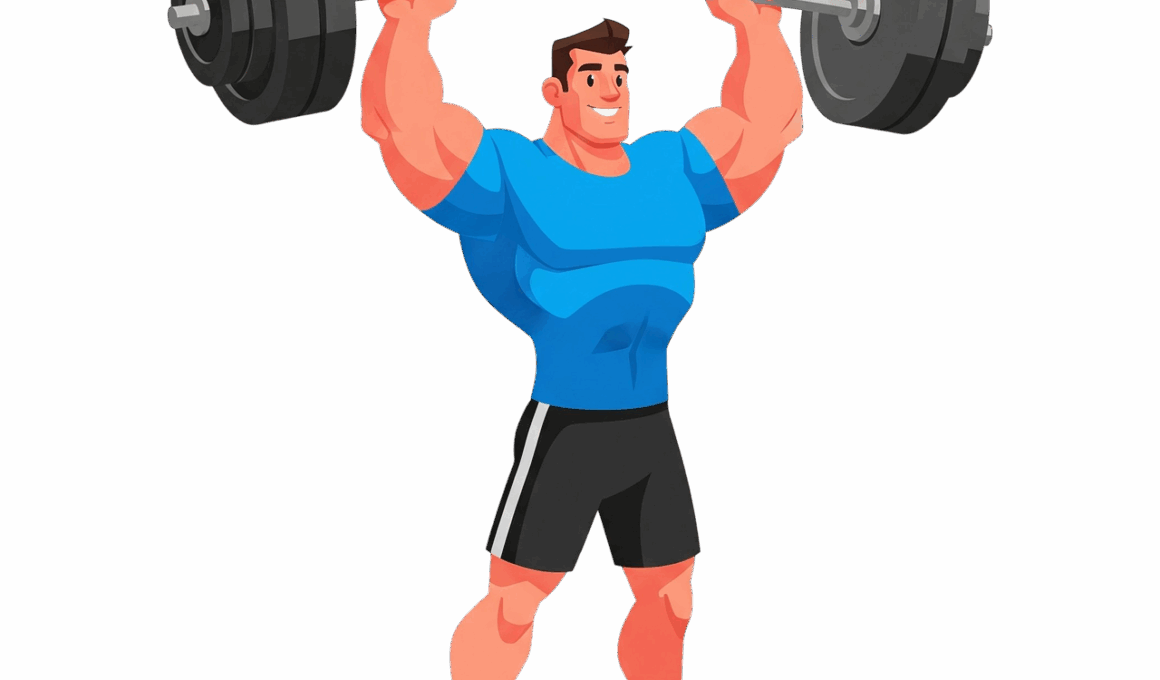Nutrition Strategies to Support Powerlifting Training in Weightlifters
Powerlifting is a demanding sport that requires optimal nutrition strategies to facilitate peak performance and recovery. To support their training regime, weightlifters need to focus on a diet enriched with macronutrients tailored for energy, muscle growth, and repair. A diet high in protein is essential for muscle synthesis; therefore, incorporating sources like lean meats, dairy, and legumes can greatly benefit strength gains. In addition, carbohydrates should not be neglected, as they are crucial for providing energy during intense weightlifting sessions. Foods such as whole grains, bananas, and rice offer the necessary carbohydrates that fuel both training and recovery. Moreover, proper hydration is vital, and weightlifters must ensure they drink adequate water throughout the day. Lastly, including healthy fats from nuts, seeds, and avocados in their diet can support overall health and hormone production. By following these nutritional guidelines, weightlifters can effectively enhance their performance and achieve their lifting goals while reducing the risk of injury.
In addition to understanding macronutrients, timing meals around training can play a pivotal role in optimal performance. Consuming a pre-workout meal approximately 1-2 hours prior to training can provide the necessary fuel to tackle heavy lifts. This meal should be rich in both carbohydrates and proteins to maximize energy availability and support muscle endurance. For a post-workout meal, it is equally important to replenish glycogen stores and start muscle recovery. This can be achieved by consuming a mix of carbohydrates and protein within 30 minutes after completing the workout. Smoothies, protein bars, or whole food meals featuring chicken and sweet potatoes can be ideal choices. Additionally, utilizing protein supplements may be beneficial for weightlifters struggling to meet their protein needs through whole foods alone. Including micronutrients from fruits, vegetables, and supplements ensures that the body functions optimally and heals efficiently. Remember, nutrition in powerlifting is not just about immediate gains but also long-term health for enduring success.
Understanding Supplements in Powerlifting
Supplements can also play a role in supporting weightlifters striving for competitive excellence. Creatine monohydrate, for instance, is widely recognized for its efficacy in boosting strength and muscle mass when paired with a dedicated training program. Moreover, branched-chain amino acids (BCAAs) are known to aid in muscle recovery, potentially reducing soreness after intense lifting sessions. It’s also important to consider the optimization of protein intake; whey protein isolate is a fast-absorbing supplement that can help achieve daily protein goals effectively. However, weightlifters should carefully assess their dietary habits before supplementing, as meeting nutrient requirements through whole foods should always be prioritized. An understanding of supplement quality and efficacy is essential, as not all products are created equal. Consulting with a sports nutritionist can help tailor a supplementation plan that aligns with individual goals. When used wisely, supplements can certainly complement a well-structured diet to support powerlifting training and overall performance improvements.
Monitoring performance and changing nutrition according to body response is crucial for long-term growth. Weightlifters need to be aware of their body composition, energy levels, and recovery times as they progress in their training. Regularly assessing these factors can guide dietary modifications necessary for improving strength gains and ensuring continued advancement. For instance, if energy levels drop during training sessions, increasing calorie intake may be beneficial, particularly in the form of nutritious snacks like trail mix or protein smoothies. Alternatively, if weight gain is problematic, assessing portion sizes and reducing overall caloric intake strategically may help. Tracking food intake while keeping a journal of workouts may provide insight into what dietary strategies yield the best outcomes. Adaptability is key, and reviewing nutritional strategies regularly ensures that the body receives the necessary support to peak at the right times during competition phases. An informed approach to nutrition will allow weightlifters to excel not just as athletes but also as health-conscious individuals in their sport.
Hydration and Its Importance
Hydration is another critical aspect that often gets underestimated in the performance of powerlifting. Water plays an essential role in every bodily function, including temperature regulation and nutrient transport. Weightlifters need to maintain adequate hydration levels, particularly during intense training or competition. Electrolyte management also becomes vital, as the body may lose valuable minerals through sweating, especially during heavy lifting. Consuming electrolyte-rich beverages can help restore these minerals effectively. Ideally, weightlifters should monitor their hydration status by observing body weight changes before and after workouts. Drinking water consistently throughout the day, rather than waiting until thirst is felt, will ensure the body can fully perform during lifts. Strategies such as carrying a water bottle to training sessions or setting hydration reminders can keep fluid intake consistent. Proactively maintaining hydration levels not only improves physical performance but also enhances overall well-being and concentration during lifts, which is critical for achieving personal records in powerlifting.
While physical training is essential for powerlifting, combining it with appropriate nutrition sets the stage for holistic development. Establishing a regular meal schedule that aligns with training times can create a structured feeding habit, ensuring consistent nutrient availability. Furthermore, involving variety in food choices helps meet vitamin and mineral requirements effectively. Consuming a range of colored fruits and vegetables infuses essential nutrients and antioxidant properties into the diet, aiding recovery and immune function. Weightlifters may benefit from planning meals ahead and prepping foods for convenience during busy weeks. Learning to cook simple, wholesome recipes that align with goals can ease stress and reliance on processed foods. Meal prepping protein sources, carbohydrates, and vegetables can set weightlifters up with nutritious options ready to consume immediately after training or during the day. With mindful planning, weightlifters can build a strong connection to their food, which translates into improved focus and greater enjoyment in their training journeys.
Conclusion
In conclusion, optimal nutrition and hydration strategies are paramount for weightlifters engaged in powerlifting. Weightlifters aiming for increased strength and performance must focus on structured meal planning, nutrient timing, and an awareness of body needs. A balanced diet rich in macronutrients supports extensive training while ensuring recovery and muscle growth. Supplementation can also aid in addressing specific dietary gaps, though its usage should be informed and supported by whole foods. Hydration, often overshadowed, must be prioritized to maintain performance levels. Cultivating healthy eating habits, adapting to personal requirements, and making informed nutritional choices will pave the way for significant progress. Ultimately, nutrition is a vital partner in realizing powerlifting ambitions, enhancing both physical capability and long-term health outcomes. Therefore, dedication to nutrition and hydration should be embraced as integral components of a successful powerlifting training journey.


